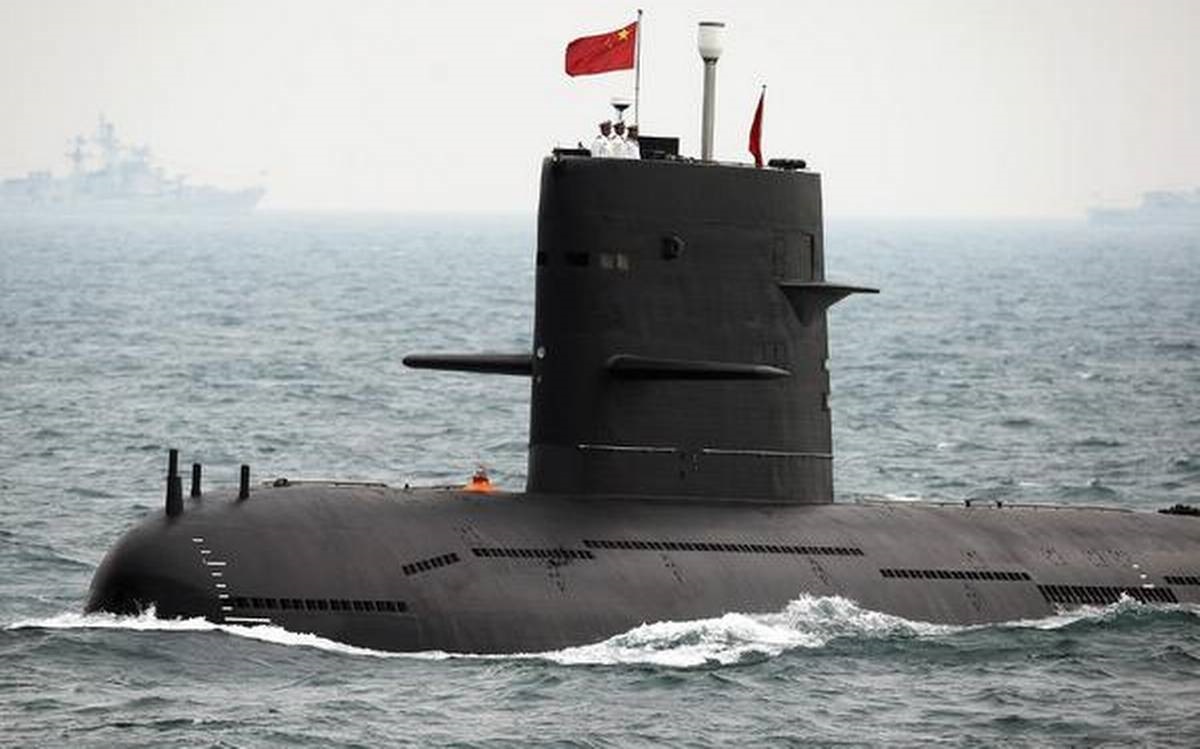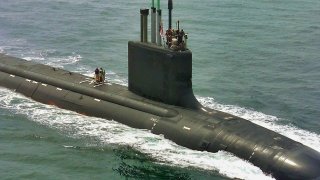The U.S. Navy Shouldn't Gloat over China's Submarine Setback
It seems China’s People’s Liberation Army (PLA) Navy is not omnicompetent after all—sleepless efforts at image management notwithstanding. Last week Reuters picked up the story, first broken by the Wall Street Journal, of how a Type 041 Zhou-class nuclear-powered attack submarine (SSN), the first in a new generation of PLA Navy attack boats, sank at its berth in Wuchang Shipyard, Wuhan, this May or June.
It seems China’s People’s Liberation Army (PLA) Navy is not omnicompetent after all—sleepless efforts at image management notwithstanding. Last week Reuters picked up the story, first broken by the Wall Street Journal, of how a Type 041 Zhou-class nuclear-powered attack submarine (SSN), the first in a new generation of PLA Navy attack boats, sank at its berth in Wuchang Shipyard, Wuhan, this May or June.
Water and machinery do not mix well. Sunken vessels have been raised and returned to service before, but doing so takes resources and time. In all likelihood the sinking will set back the Type 041 program back by months if not years, and China’s bluewater aspirations with it. The PLA Navy sagely devoted its early efforts at fleet development to access and area denial. The seaborne component of access denial rode on missile-armed diesel-electric attack submarines and surface patrol craft—ships of war that don’t need nuclear propulsion to reach their offshore patrol grounds, perform picket duty, and return to port.
The navy demoted nuclear-propelled subs to secondary priority until the Chinese Communist leadership gained confidence in its ability to set the terms of entry into the Western Pacific. To all appearances the leadership has now gained that confidence, and has resolved to augment the navy’s current flotilla of six SSNs.
After this spring’s debacle, though, it seems clear Xi Jinping & Co. will have to wait awhile to see their loftier ambitions for undersea warfare fulfilled. In the meantime they have a political problem on their hands. The unnamed U.S. official who disclosed the Type 041 disaster to the press observed that, “in addition to the obvious questions about training standards and equipment quality, the incident raises deeper questions about the PLA’s internal accountability and oversight of China's defense industry—which has long been plagued by corruption.”
In other words, the accident cast doubts on the PLA Navy’s competence—and doubts about a fighting force’s competence undercut its ability to deter or coerce foes and reassure allies and friends that it will be there for them when the going gets tough. Readers of these pixels know that I am fond of Henry Kissinger’s workmanlike formula for deterrence, which depicts deterrence as a product of multiplying capability by the resolve to use it by the degree to which the antagonist supposedly being deterred believes in our capability and resolve it—in our strength and determination to carry out our deterrent threats, in other words. Because this is multiplication, no factor may be zero—or deterrence will be zero as well.
So the trick to armed diplomacy is firewalling capability, willpower, and belief. If an opponent knows we can and will thwart its aims, it should stand down rather than defy our threats. To do otherwise would be a forlorn hope—a no-win option no rational actor would entertain.
Helpful as it is, Kissinger’s formula obscures a key human variable. Competence belongs in it as a fourth critical variable. All the capability and all the political willpower in the world avail little if our antagonist concludes that the people wielding our military capability are a bunch of chumps. Hostile leaders may conclude we are unable to carry out our threats or keep our commitments to allies, partners, and friends. They will do what they please, uncowed by what we say and do.
This logic applies to China as well, even though state control of the media grants Chinese Communist Party magnates the ability to manufacture reality—to a point. Doubtless the party has been able to silence or at least muffle the news of the submarine sinking within China. But the chief target audiences for Chinese deterrence, coercion, and reassurance lie outside of China. Exposing PLA mishaps to the wider world can only damage China’s martial diplomacy to the advantage of China’s rivals.
We should do that early and often.
We Americans should resist the temptation to gloat, though. The U.S. Navy and the larger maritime sector have suffered a one hammer blow after another to their reputation for competence over the past several years. Another fell just last week, around the same time the Type 041 debacle came to light. To wit, the Henry J. Kaiser-class fleet oiler USNS Big Horn, the main supply ship for the USS Abraham Lincoln carrier task force, ran aground in the Arabian Sea. Big Horn suffered flooding in its engineering spaces as well as rudder damage and had to be towed to port in Oman for repairs. Laying it up deprives the carrier group of fuel and precious supplies without which no fleet can operate at sea for long.

Reportedly no replacement vessel with adequate cargo capacity is available. With Big Horn sidelined, it remains to be seen how Abraham Lincoln and its escorts will offset the loss of logistical support. If vessels comprising the task force have to put into port to replenish fuel and stores, that will thin out the naval presence in the Red Sea—creating a more permissive setting for Houthi attacks on shipping in that vital waterway. This on top of recent news that navy leaders are considering idling seventeen ships out of an already perilously lean logistics fleet because too few civilian mariners are available to crew them.
Peacetime strategic competition is virtual war. Competitors try to convince important audiences they would prevail should armed strife ensue. The competitor that sways audiences able to influence the outcome of the competition tends to “win” a peacetime confrontation. After all, people love a winner. Thus material capability looms large in the realm of deterrence, coercion, and reassurance, as Kissinger and other scribes attest. But competence at arms—the human element of capability—bulks just as large. Without proficiency, actual and perceived, the U.S. sea services will persuade few they would be the likely victor in battle. They will do little to brighten America’s foreign-policy prospects.

Let’s up our game—pronto.
About the Author: Dr. James Holmes
James Holmes is J. C. Wylie Chair of Maritime Strategy at the Naval War College and a Faculty Fellow at the University of Georgia School of Public and International Affairs. The views voiced here are his alone.
Image Credit: Creative Commons.


